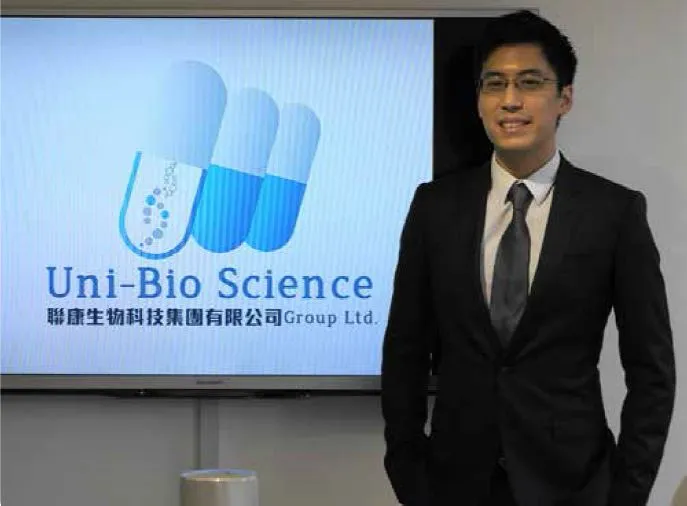
Innovation is the backbone of China's biopharma
Kingsley Leung, Executive Director of Uni-Bio Science Group, is aware that with a growing aging population, combined with a more affluent urban middle class due to the modernization of China, will place an increasing burden on China’s health care systems. “Uni-Bio Science Group’s long term strategy is to address these unmet and growing needs by pushing the boundaries of drug innovation through smart and cost effective models.” The building blocks for this strategy began over 12 years ago with the establishment of a product development program that started with R&D and has progressed through to successful outcomes in phase 3 clinical trials for efficacy and safety.
Uni-Bio Science Group is now ready to bust the blocks. Mr. Leung feels that two, soon to be launched, products have the potential to be blockbuster biopharmaceuticals in the China market. So much so that the Group is moving at a fast pace to develop the infrastructure needed to achieve sustained market growth. This year’s interim results were 18.3% as compared to 8.6% industry wide.
China’s pharmaceutical industry has been dominated by generic chemical drugs with products that lacked, in pharma speak, clinical differentiation. Biopharmaceutical drugs developed, manufactured, or made available by Uni-Bio Science in China will offer tremendous therapeutic advantages to patients. Scheduled to launch shortly, Uni-PTH are and Uni-E4 targeting the management of osteoporosisand diabetesrespectively.
According to Mr. Leung, China has an estimated 100 million diabetics as compared to 25 million in the US, yet China’s market value for diabetic management drugs is less than one fourth that of the US (US=$18B vs China=$4B). The upside potential in China for biopharmaceuticalmanagement of diabetes is tremendous. A product similar to Uni-E4 has recorded global sales in excess of US$400 million.
Improving the quality of life
Drugs used traditionally in the management of osteoporosis focused on prevention of bone loss through controlling the breakdown of existing bone. However, if the existing bone structure is already of a weak nature the bone mass will stabilize but existing bone structure does not improve in strength. Uni-PTH’s innovative approach addresses this through action that upregulates factors that increase new bone growth and improving the strength of a patient’s bone structure.
Uni-PTH can improve the quality of life for China’s aging population and decrease the burden to China’s health care system for managing patient with osteoporosis. How big a market is this? Persistence Market Research in a recent publication estimates that the global market for osteoporosis drugs to reach US$14.78 billion by the year 2022. Uni-E4 has proven in trials to effectively manage blood sugar levels in patients with diabetes while offering two other advantages. The biopharmaceutical can also enable a patient to lose weight thereby improving their diabetic condition and overall health while preventing the occurrence of hypoglycemia.
Uni-E4’s action occurs only at high blood sugar level states and is inactive at normal or lower levels. There is no overshoot. Insulin on the other had has shown to cause weight gain, hypoglycemia and could lead to hypoglycemic coma under certain conditions. Mr. Leung states, “To be a blockbuster drug in China, sales would have to reach or exceed the RMB 1 billion level.”
And to pave the way for that achievement Uni-Bio Science expects to quadruple its sales force in the coming two years prior to market entry. Uni-Bio Science has attracted a full management team with Big Pharma experience to insure the success of these two potential blockbusters as well as future products.
Leung adds that education is critical to a successful launch. Physicians by nature are very conservative and concerned for patient safety. The challenge is to educate these physicians on the clinical differentiation of Uni-E4 and Uni-PTH. Uni-Bio Science’s Medical Affairs team is headed by a former long service Pfizer staff overseeing physician and sales education and is supported by Uni-Bio Science’s commitment to success through an infrastructure platform that allows video conferencing and intranet access to communications and supporting clinical information. Uni-Bio Science is already active in the medical community attending seminars and conferences and its products are being evaluated at 15 clinical study centers by key opinion leaders in China.
Commitment to innovation
Uni-Bio Science is committed to innovation with products in the pipeline for kidney failure, anemia, and long action formulations of osteoporosis and diabetes management drugs. The company hopes to become a biopharma market leader by adding products that will position it as the leader in therapies to manage diabetes and all complications of diabetes.
Uni-Bio Science’s manufacturing mirrors European Standards for GMP a fact that will attract small and mid-cap companies outside China who desire an established infrastructure platform for entry into China to partner up thereby adding to Uni-Bio’s portfolio in the China market, Samil Pharm of Korea has recently signed a distribution agreement for a select range of their products. Leung believes that Uni-Bio Science’s commitment to innovation and development will lead to product licensing agreements for world-wide distribution much like the recent €4 billion agreement by Insight Pharmaceuticals.








![Cross Domain [Manu + SBR + ABF + ABR + FMCG + HBR + ]](https://cmg-qa.s3.ap-southeast-1.amazonaws.com/s3fs-public/styles/exclusive_featured_article/public/2025-01/earth-3537401_1920_4.jpg.webp?itok=WaRpTJwE)









 Advertise
Advertise


